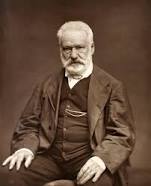Les Misérables Page #17
Les Misérables is a French historical novel by Victor Hugo, first published in 1862, that is considered one of the greatest novels of the 19th century. In the English-speaking world, the novel is usually referred to by its original French title.
With this exception, he was in all things just, true, equitable, intelligent, humble and dignified, beneficent and kindly, which is only another sort of benevolence. He was a priest, a sage, and a man. It must be admitted, that even in the political views with which we have just reproached him, and which we are disposed to judge almost with severity, he was tolerant and easy, more so, perhaps, than we who are speaking here. The porter of the town-hall had been placed there by the Emperor. He was an old non-commissioned officer of the old guard, a member of the Legion of Honor at Austerlitz, as much of a Bonapartist as the eagle. This poor fellow occasionally let slip inconsiderate remarks, which the law then stigmatized as seditious speeches. After the imperial profile disappeared from the Legion of Honor, he never dressed himself in his regimentals, as he said, so that he should not be obliged to wear his cross. He had himself devoutly removed the imperial effigy from the cross which Napoleon had given him; this made a hole, and he would not put anything in its place. "I will die," he said, "rather than wear the three frogs upon my heart!" He liked to scoff aloud at Louis XVIII. "The gouty old creature in English gaiters!" he said; "let him take himself off to Prussia with that queue of his." He was happy to combine in the same imprecation the two things which he most detested, Prussia and England. He did it so often that he lost his place. There he was, turned out of the house, with his wife and children, and without bread. The Bishop sent for him, reproved him gently, and appointed him beadle in the cathedral. In the course of nine years Monseigneur Bienvenu had, by dint of holy deeds and gentle manners, filled the town of D----with a sort of tender and filial reverence. Even his conduct towards Napoleon had been accepted and tacitly pardoned, as it were, by the people, the good and weakly flock who adored their emperor, but loved their bishop. CHAPTER XII--THE SOLITUDE OF MONSEIGNEUR WELCOME A bishop is almost always surrounded by a full squadron of little abbés, just as a general is by a covey of young officers. This is what that charming Saint François de Sales calls somewhere "les prêtres blancs-becs," callow priests. Every career has its aspirants, who form a train for those who have attained eminence in it. There is no power which has not its dependents. There is no fortune which has not its court. The seekers of the future eddy around the splendid present. Every metropolis has its staff of officials. Every bishop who possesses the least influence has about him his patrol of cherubim from the seminary, which goes the round, and maintains good order in the episcopal palace, and mounts guard over monseigneur's smile. To please a bishop is equivalent to getting one's foot in the stirrup for a sub-diaconate. It is necessary to walk one's path discreetly; the apostleship does not disdain the canonship. Just as there are bigwigs elsewhere, there are big mitres in the Church. These are the bishops who stand well at Court, who are rich, well endowed, skilful, accepted by the world, who know how to pray, no doubt, but who know also how to beg, who feel little scruple at making a whole diocese dance attendance in their person, who are connecting links between the sacristy and diplomacy, who are abbés rather than priests, prelates rather than bishops. Happy those who approach them! Being persons of influence, they create a shower about them, upon the assiduous and the favored, and upon all the young men who understand the art of pleasing, of large parishes, prebends, archidiaconates, chaplaincies, and cathedral posts, while awaiting episcopal honors. As they advance themselves, they cause their satellites to progress also; it is a whole solar system on the march. Their radiance casts a gleam of purple over their suite. Their prosperity is crumbled up behind the scenes, into nice little promotions. The larger the diocese of the patron, the fatter the curacy for the favorite. And then, there is Rome. A bishop who understands how to become an archbishop, an archbishop who knows how to become a cardinal, carries you with him as conclavist; you enter a court of papal jurisdiction, you receive the pallium, and behold! you are an auditor, then a papal chamberlain, then monsignor, and from a Grace to an Eminence is only a step, and between the Eminence and the Holiness there is but the smoke of a ballot. Every skull-cap may dream of the tiara. The priest is nowadays the only man who can become a king in a regular manner; and what a king! the supreme king. Then what a nursery of aspirations is a seminary! How many blushing choristers, how many youthful abbés bear on their heads Perrette's pot of milk! Who knows how easy it is for ambition to call itself vocation? in good faith, perchance, and deceiving itself, devotee that it is. Monseigneur Bienvenu, poor, humble, retiring, was not accounted among the big mitres. This was plain from the complete absence of young priests about him. We have seen that he "did not take" in Paris. Not a single future dreamed of engrafting itself on this solitary old man. Not a single sprouting ambition committed the folly of putting forth its foliage in his shadow. His canons and grand-vicars were good old men, rather vulgar like himself, walled up like him in this diocese, without exit to a cardinalship, and who resembled their bishop, with this difference, that they were finished and he was completed. The impossibility of growing great under Monseigneur Bienvenu was so well understood, that no sooner had the young men whom he ordained left the seminary than they got themselves recommended to the archbishops of Aix or of Auch, and went off in a great hurry. For, in short, we repeat it, men wish to be pushed. A saint who dwells in a paroxysm of abnegation is a dangerous neighbor; he might communicate to you, by contagion, an incurable poverty, an anchylosis of the joints, which are useful in advancement, and in short, more renunciation than you desire; and this infectious virtue is avoided. Hence the isolation of Monseigneur Bienvenu. We live in the midst of a gloomy society. Success; that is the lesson which falls drop by drop from the slope of corruption.
Translation
Translate and read this book in other languages:
Select another language:
- - Select -
- 简体中文 (Chinese - Simplified)
- 繁體中文 (Chinese - Traditional)
- Español (Spanish)
- Esperanto (Esperanto)
- 日本語 (Japanese)
- Português (Portuguese)
- Deutsch (German)
- العربية (Arabic)
- Français (French)
- Русский (Russian)
- ಕನ್ನಡ (Kannada)
- 한국어 (Korean)
- עברית (Hebrew)
- Gaeilge (Irish)
- Українська (Ukrainian)
- اردو (Urdu)
- Magyar (Hungarian)
- मानक हिन्दी (Hindi)
- Indonesia (Indonesian)
- Italiano (Italian)
- தமிழ் (Tamil)
- Türkçe (Turkish)
- తెలుగు (Telugu)
- ภาษาไทย (Thai)
- Tiếng Việt (Vietnamese)
- Čeština (Czech)
- Polski (Polish)
- Bahasa Indonesia (Indonesian)
- Românește (Romanian)
- Nederlands (Dutch)
- Ελληνικά (Greek)
- Latinum (Latin)
- Svenska (Swedish)
- Dansk (Danish)
- Suomi (Finnish)
- فارسی (Persian)
- ייִדיש (Yiddish)
- հայերեն (Armenian)
- Norsk (Norwegian)
- English (English)
Citation
Use the citation below to add this book to your bibliography:
Style:MLAChicagoAPA
"Les Misérables Books." Literature.com. STANDS4 LLC, 2025. Web. 7 Feb. 2025. <https://www.literature.com/book/les_mis%C3%A9rables_13>.








Discuss this Les Misérables book with the community:
Report Comment
We're doing our best to make sure our content is useful, accurate and safe.
If by any chance you spot an inappropriate comment while navigating through our website please use this form to let us know, and we'll take care of it shortly.
Attachment
You need to be logged in to favorite.
Log In